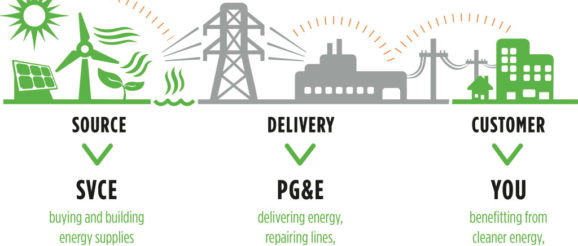Opinion: Why PUC should protect clean energy innovation

Santa Clara and San Mateo counties have made major strides in reducing greenhouse gas emissions through our respective Community Choice Energy agencies. Peninsula Clean Energy launched in 2016, and Silicon Valley Clean Energy followed in 2017. These agencies are responsible for buying our electricity, while PG&E still delivers power, maintains lines and sends bills.
In 2017, our combined 32 cities, towns and numerous unincorporated county communities avoided 1.7 billion pounds of carbon from buying clean power. In 2018, our 560,000 customers will collectively save $37 million through lower electricity rates – additional spending power that stays in our region.
A decision before the California Public Utilities Commission threatens our progress and innovation.
The Power Charge Indifference Adjustment (PCIA), is an “exit fee” charged by investor-owned utilities, like PG&E, to customers that switch to another electricity provider such as Community Choice Energy. The fee compensates utilities for power they bought in the past at prices that are now above-market. The calculation methodology of this fee has been the subject of a long-contested regulatory battle.
On Aug. 1, the PUC issued a proposed decision to reform the PCIA. It provides a balanced approach as it maintains the exit fee at reasonable levels, while transitioning to a longer-term solution. The proposed decision is a step in the right direction and supports the legislative intent of the law that created Community Choice Energy in 2002 (AB 117), which provides customers with competitive, clean energy options and transparency through local governance.
However, a couple of weeks later, an alternate proposed decision was issued that significantly favors the utilities and would greatly harm Community Choice Energy programs. The alternate would disrupt energy markets, creating rate instability for millions of California ratepayers already served by the growing Community Choice Energy movement in over a dozen counties from Humboldt to San Diego. If approved, the alternate proposal will reduce competition and choice for California consumers and rule in the favor of private, corporate interests.
The PUC is scheduled to vote on this matter Thursday. We urge commissioners to adopt the original proposed decision that better balances all customer’s interests, whether they are utility customers, or a community choice customer.
The alternate decision, if adopted, would have an immediate destabilizing impact on energy markets. It could potentially affect the launch of some newer community choice programs, curtail the development of new renewable energy projects, and limit Peninsula Clean Energy’s and Silicon Valley Clean Energy’s ability to invest in local energy programs.
Peninsula Clean Energy and Silicon Valley Clean Energy are accelerating energy innovation through local programs that will continue to lower greenhouse gas emissions and advance our state’s climate goals. Such programs include advancing electric vehicle adoption and piloting new energy storage technologies.
Our agencies, while new, already have a proven track record of advancing our clean energy economy decades ahead of state mandates. We must continue making significant reductions in greenhouse gas emissions and investing in new clean energy development and technologies. True to our Silicon Valley spirit, we want disruptive innovation, not disruptive regulation.
Dave Cortese represents District 3 on the Santa Clara County Board of Supervisors and is a member of the Silicon Valley Clean Energy Board of Directors. Dave Pine is president of the San Mateo County Board of Supervisors and is a member of the Peninsula Clean Energy Board of Directors.
